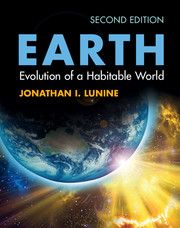‘The keenly awaited second edition of Lunine’s book does not disappoint. The clarity of writing and level of scholarship remain high, and there is no other treatment of our planet with this interdisciplinary breadth. As we home in on Earth-like worlds far from home, this book is a perfect component for an undergraduate astronomy or astrobiology course.’
Chris Impey - University Distinguished Professor, University of Arizona
‘Lunine focusses on the Earth as a system, and sets it in context in comparison with other Solar System bodies. This is how a geoscience text should be done these days.’
David A. Rothery - The Open University
‘Earth: Evolution of a Habitable World brings the knowledge gained by 50 years of Solar System exploration back to Earth and infuses the often hazy first half of Earth history with new energy and insight, providing a unique perspective on the entire history of our home planet.’
James Head - Louis and Elizabeth Scherck Distinguished Professor of Geological Sciences, Brown University
‘Lunine’s astrobiological perspective on Earth history is a breath of fresh air, drawing on the entire breadth of science to address fundamental questions about the origins of life, and the development of the systems that sustain it here on Earth, in a manner that quickly and directly connects to students.’
Marshall Bartlett - Chair of Physics, Hollins University
'… I’ve never seen anything quite like it … This would be a spectacular text for a course providing a perspective on Earth and planetary science and modern issues in our stewardship of the Earth for students majoring in fields outside the geosciences … It could even give geology students perspective on the 'deep time' that is beyond the vast majority of Earth's geologic record, and on Earth's place in the solar system … Jonathan Lunine is a scientist who knows his planetary climates, having studied atmospheres of worlds inside and outside our solar system, and who has done lots of recent work on astrobiology.'
Emily Lakdawalla
Source: The Planetary Society (planetary.org)
'Earth: Evolution of a Habitable World succeeds remarkably in providing a well-balanced, enjoyable, and crystal clear summary of a broad set of topics that together introduce Earth and life in its complexity and interconnectedness. The book is rich in up-to-date research and it simultaneously provides a breadth and depth that are unmatched - students, interested laymen, and researchers will all enjoying reading it. What set[s] Lunine's text apart from the increasing number of great astrobiology books [is] the unmatched clarity of the text, its logical and well-balanced structure, and the surprising level of detail that the book succeeds in providing over the breadth of topics covered. Earth: Evolution of a Habitable World is an excellent book for geosciences, planetary sciences, and astrobiology - it is set to be a classic, like its first edition was.'
Daniel Apai
Source: Meteoritics and Planetary Science
'When this book arrived for review and I scanned the contents my first thought was, 'This looks like a great asset to my current OU studies …' and by and large I have to say it has been a good companion. … well structured and easy enough to read … I enjoyed this book …'
David Swain
Source: Open University Geological Society Journal
'Lunine always shows us the exact nature of the evidence that leads scientists to be able to piece together the jigsaw puzzle they are trying to solve. He does this with careful referencing and good use of figures, so that the interested reader will always know where to look up more information, or investigate the data more deeply themselves.'
Vijay Tymms
Source: New Directions
'I marvelled at the huge scope of science, and the amount of integration of different fields that astrobiologists have achieved. This book would be extremely useful to anyone with gaps in their astrobiology knowledge; if the book does not completely fill them, it will certainly point you to other sources that can. … It is a mine of treasure in references and scientific leads, and it also highlights areas that are not yet fully understood, where more research can be undertaken. I definitely recommend it to all who want to know more about how we can study astrobiology, and also to the nonmathematical, for while we do meet a few equations and methods, they are kept as simple as possible.'
Alice Sheppard
Source: Astrobiology Society of Britain (www.astrobiologysociety.org)





